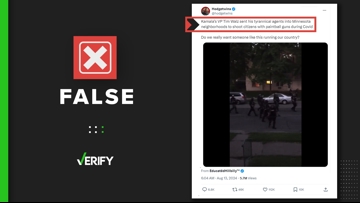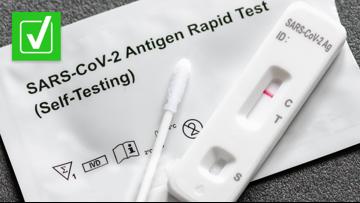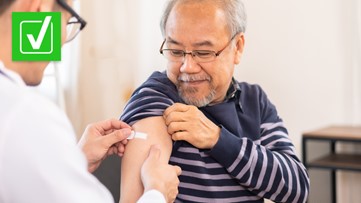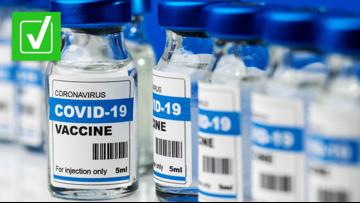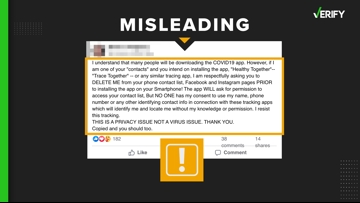As cases of the omicron variant continue to drop throughout the United States, there has been a lot of speculation within the last week on social media about whether the Centers for Disease Control and Prevention (CDC) would update its mask guidance across the country.
State and local governments are not required to follow the CDC guidance, but many look to the CDC’s recommendations when setting regional guidelines and mandates.
THE QUESTION
Did the CDC revise its mask guidance?
THE SOURCES
- Centers for Disease Control and Prevention (CDC)
- Rochelle P. Walensky, M.D., director of the Centers for Disease Control and Prevention (CDC)
- Greta Massetti, Ph.D., branch chief of the Field Epidemiology and Prevention Branch and a senior epidemiologist in the Division of Violence Prevention of CDC’s National Center for Injury Prevention and Control
- Jen Psaki, White House press secretary
THE ANSWER
Yes, the CDC did revise its mask guidance.
WHAT WE FOUND
The Centers for Disease Control and Prevention no longer advises indoor masking for people in many areas of the U.S., according to updated guidance released by the agency Friday.
The CDC launched a new tool to help communities across the country decide what COVID-19 prevention measures to take based on the latest case and hospitalization data, including whether to wear masks indoors.
The CDC's new guidance uses a benchmark called “community levels,” which can be low, medium, or high, depending on the number of hospital beds in use, hospital admissions and the total number of new COVID-19 cases in an area.
“This updated approach focuses on directing our prevention efforts towards protecting people at high risk for severe illness and preventing hospitals and healthcare systems from being overwhelmed,” CDC director Dr. Rochelle Walensky said during a Feb. 25 telebriefing.
Per the new tool, the CDC recommends that people who live in low-level areas should stay up-to-date with their vaccinations and get tested if they have symptoms. Though wearing masks is not part of the CDC recommendations for people in these areas, local mandates may still apply.
In medium-level areas, people who are at high risk for severe illness should talk to their healthcare provider about whether they need to wear a mask and take other precautions. They should also stay up-to-date with their vaccinations and get tested if they have symptoms.
In high-level areas, the CDC says people should wear masks indoors, stay up-to-date with their vaccinations, get tested if they have symptoms and take additional precautions if at high risk for severe illness.
Current COVID-19 community levels data puts more than 70% of the U.S. population in counties where COVID-19 poses a low or medium threat to hospitals. This means people can stop wearing masks indoors in those areas if they choose to do so, according to the CDC.
“Communities can use these metrics along with their own local metrics, such as wastewater surveillance, emergency department visits, and workforce capacity to update and further inform their local policies and ensure equity and prevention efforts,” Dr. Greta Massetti, branch chief of the CDC’s Field Epidemiology and Prevention Branch, said during the telebriefing.
“These categories help individuals assess what impacts COVID-19 is having on their community so that they can decide if they need to take extra precautions, including masking, based on their location, their health status and their risk tolerance.”
The agency says people who want to continue wearing masks are free to do so regardless of the current community level. Meanwhile, people with symptoms, a positive test, or exposure to someone with COVID-19 should wear a mask, the CDC says. The new recommendations also do not change the requirement to wear masks on public transportation and indoors in airports, train stations and bus stations.
“What the CDC is conveying is that America is in a stronger place today as a nation. We have more tools than ever before to protect ourselves from COVID-19: vaccinations, boosters, treatments, testing, high-quality masks, improved ventilation — over 200 million people are vaccinated, nearly 100 million Americans have been boosted. And the CDC is providing public health guidance that has a couple of different clear levels so that people can understand what their recommendation is as it relates to wearing a mask,” said White House press secretary Jen Psaki during a Feb. 25 press briefing.
Some places, including Oregon, Washington and Hawaii, still have statewide indoor mask mandates in place. Although the CDC updated its mask guidance, those mandates remain in effect as of Feb. 25.
More from VERIFY: Yes, the CDC changed its definition of vaccine to be 'more transparent'



